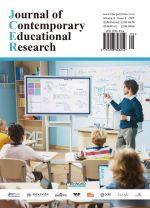Redesigning and Exploring the Curriculum Framework for Human Resource Management under the New Liberal Arts Initiative
Abstract
As China’s higher education transitions from extensive expansion to intensive development, the ‘New Liberal Arts’ concept has emerged as a pivotal strategic direction for transforming humanities disciplines. This approach emphasizes interdisciplinary integration, parallel development of theory and practice, and optimizing talent cultivation models guided by societal demands. The diversified economic structure and high-quality development trajectory of the Guangdong-Hong Kong-Macao Greater Bay Area present new demands for talent cultivation, curriculum design, and pedagogical reform within university Human Resource Management (HRM) programs. Taking Guangzhou Huashang College as the research subject, this paper analyses the core competencies required for HRM programs under the New Liberal Arts framework through policy document analysis, literature review, and field research. It identifies shortcomings in the current curriculum system regarding knowledge structure, practical pathways, and cross-disciplinary integration. Guided by Outcome-Based Education (OBE) and Competency-Based Education (CBE) frameworks, a new curriculum architecture was designed comprising four pillars: general education and humanities literacy, professional core competencies, cross-disciplinary integration, and practical innovation. Practical explorations were undertaken in areas such as university-enterprise collaboration and industry-education integration. Preliminary outcomes demonstrate that the new scheme comprehensively enhances students’ data comprehension, strategic awareness, and humanistic sensitivity, providing a reference paradigm for the high-quality development of HRM programs within the new liberal arts context.
References
Ministry of Education, 2019, Opinions of the Ministry of Education on Accelerating the Development of High-Calibre Undergraduate Education and Comprehensively Enhancing Talent Cultivation Capabilities. Bulletin of the Ministry of Education, 2019(11): 4–9.
Department of Higher Education, Ministry of Education, 2020, Declaration on the Development of the New Liberal Arts. Chinese University Teaching, 2020(12): 4–9.
Liu X, 2021, Transformation and Innovation in Human Resource Management Programmes Amidst Digital Transformation. China Human Resource Development, 38(5): 6–15.
Xu L, 2021, Concepts, Pathways and Strategies for New Liberal Arts Development. Research in Higher Education, 42(3): 56–63.
Li Z, 2022, Reflections and Practices on Curriculum System Reconstruction in the Context of New Liberal Arts. Chinese Higher Education Research, 2022(4): 45–50.
Wang Y, 2021, Research on Innovation in Business Talent Cultivation Models in the Digital Economy Era. Management World, 37(8): 118–130.
Zhang Y, 2020, Construction of a Human Resource Management Curriculum System Based on the HR Three Pillars Model. Human Resource Development, 2020(18): 62–65.
China Human Resource Development Association, 2023, White Paper on China’s HR Capability Development. Beijing: China Human Resource Development Press.
Guangdong Provincial Bureau of Statistics, 2023, Statistical Bulletin on Guangdong’s National Economy and Social Development 2022. Guangzhou: Guangdong Statistics Press.
Chen H, 2020, An Exploration of the Essence and Pathways for New Liberal Arts Development. Educational Research, 41(6): 78–85.
Zhao M, 2019, International Comparison and Implications for the Curriculum System of Human Resource Management Majors. Comparative Education Research, 2019(4): 92–99.
Yang D, 2021, Practice and Reflections on Interdisciplinary Curriculum Development in the Context of New Liberal Arts. Research on Higher Engineering Education, 2021(3): 105–110.
Dong K, 2020, Digital Transformation in Human Resource Management and Educational Responses. Chinese Public Administration, 2020(10): 120–125.
Luo Z, 2022, Application Research of Competency-Based Education in Human Resource Management Programmes. Modern Education Management, 2022(5): 88–94.
Huang W, 2021, Research on Constructing School-Enterprise Collaborative Education Mechanisms. Research on Education Development, 41(18): 76–82.
Sun J, 2019, Construction and Implementation of a Practical Teaching System for Human Resource Management Majors. Chinese University Teaching, 2019(7): 65–69.
Wang X, 2020, Innovation in Business Talent Cultivation Models Under the New Liberal Arts Paradigm. Business Economics and Management, 2020(6): 85–92.
Zheng X, 2021, Research on the Development Pathways for Human Resource Data Analysis Competencies. Statistics and Decision Making, 37(14): 179–182.
Liu J, 2022, Characteristics of Human Resource Demand in the Guangdong-Hong Kong-Macao Greater Bay Area and Educational Responses. Southern Population, 37(2): 65–74.
Zhou Y, 2020, A Study on the Application Effectiveness of Case Teaching Method in Human Resource Management Courses. Education Theory and Practice, 40(24): 55–58.
Wu C, 2019, Research on Curriculum System Design Based on OBE Principles. Higher Education Exploration, 2019(5): 101–106.
Zhang W, 2021, Trends in Human Resource Management Transformation and Educational Implications in the Digital Era. Research on Science and Technology Management, 41(16): 150–156.
Ma L, 2022, Research on Interdisciplinary Teaching Team Development in the Context of New Liberal Arts. Research on Teacher Education, 34(1): 95–101.
Zhu F, 2020, Innovation and Practice of Industry-University Collaboration Models in Human Resource Management Programmes. Vocational and Technical Education in China, 2020(30): 75–80.
Wang J, 2021, Course Development and Implementation of Human Resource Information Systems. Modern Educational Technology, 31(8): 110–116.

